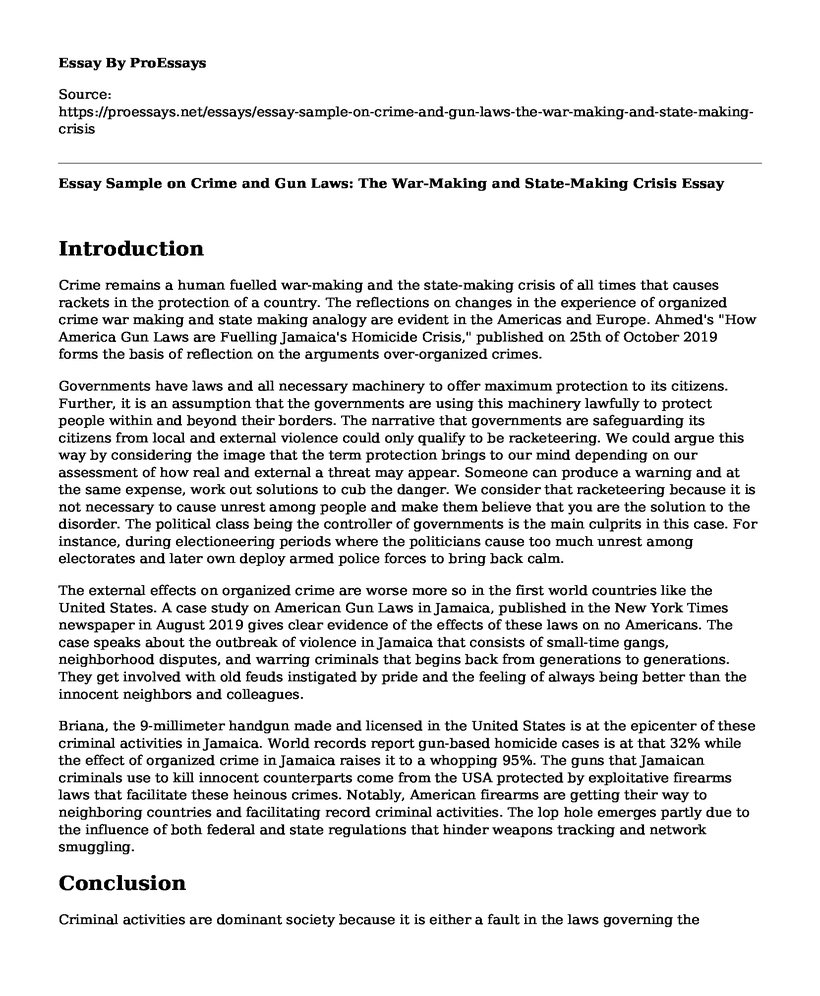Introduction
Crime remains a human fuelled war-making and the state-making crisis of all times that causes rackets in the protection of a country. The reflections on changes in the experience of organized crime war making and state making analogy are evident in the Americas and Europe. Ahmed's "How America Gun Laws are Fuelling Jamaica's Homicide Crisis," published on 25th of October 2019 forms the basis of reflection on the arguments over-organized crimes.
Governments have laws and all necessary machinery to offer maximum protection to its citizens. Further, it is an assumption that the governments are using this machinery lawfully to protect people within and beyond their borders. The narrative that governments are safeguarding its citizens from local and external violence could only qualify to be racketeering. We could argue this way by considering the image that the term protection brings to our mind depending on our assessment of how real and external a threat may appear. Someone can produce a warning and at the same expense, work out solutions to cub the danger. We consider that racketeering because it is not necessary to cause unrest among people and make them believe that you are the solution to the disorder. The political class being the controller of governments is the main culprits in this case. For instance, during electioneering periods where the politicians cause too much unrest among electorates and later own deploy armed police forces to bring back calm.
The external effects on organized crime are worse more so in the first world countries like the United States. A case study on American Gun Laws in Jamaica, published in the New York Times newspaper in August 2019 gives clear evidence of the effects of these laws on no Americans. The case speaks about the outbreak of violence in Jamaica that consists of small-time gangs, neighborhood disputes, and warring criminals that begins back from generations to generations. They get involved with old feuds instigated by pride and the feeling of always being better than the innocent neighbors and colleagues.
Briana, the 9-millimeter handgun made and licensed in the United States is at the epicenter of these criminal activities in Jamaica. World records report gun-based homicide cases is at that 32% while the effect of organized crime in Jamaica raises it to a whopping 95%. The guns that Jamaican criminals use to kill innocent counterparts come from the USA protected by exploitative firearms laws that facilitate these heinous crimes. Notably, American firearms are getting their way to neighboring countries and facilitating record criminal activities. The lop hole emerges partly due to the influence of both federal and state regulations that hinder weapons tracking and network smuggling.
Conclusion
Criminal activities are dominant society because it is either a fault in the laws governing the community or the people responsible for the implementation of those laws. Amendments in attempts to rectify the mistakes should take the course to cub the rising number of unnecessary loss of lives. For instance, the Jamaica homicide case can be under control when regulations on firearms in the USA are effective to discourage unlawful gun supply to Jamaica for peaceful regional coexistence.
Bibliography
Canudas-Romo, Vladimir, and Jose Manuel Aburto. "Youth lost to homicides: disparities in survival in Latin America and the Caribbean." BMJ global health, 4, no. 2 (2019): e001275.
Tilly, Charles. "War making and state making as organized crime." In Collective Violence, Contentious Politics, and Social Change, pp. 121-139. Routledge, 2017.
Cite this page
Essay Sample on Crime and Gun Laws: The War-Making and State-Making Crisis. (2023, Feb 15). Retrieved from https://proessays.net/essays/essay-sample-on-crime-and-gun-laws-the-war-making-and-state-making-crisis
If you are the original author of this essay and no longer wish to have it published on the ProEssays website, please click below to request its removal:
- Should Certain Crimes be Labeled as Hate Crimes Essay
- The Way Illegal Immigrants Phase Criminal Injustices While Being Undocumented in the U.S
- Key Aspects of the Juvenile Case of Mary Bell - Paper Example
- Civil and Alternate Dispute Resolution Process Essay
- Paper Example on Drug Courts: Examining Their Benefits in Today's Society
- Essay Example on LGBT Rights & Equality: Booker Muhlayasia Case
- Essay on UN Peacekeeping: 3 Principles for Preserving International Tranquility







